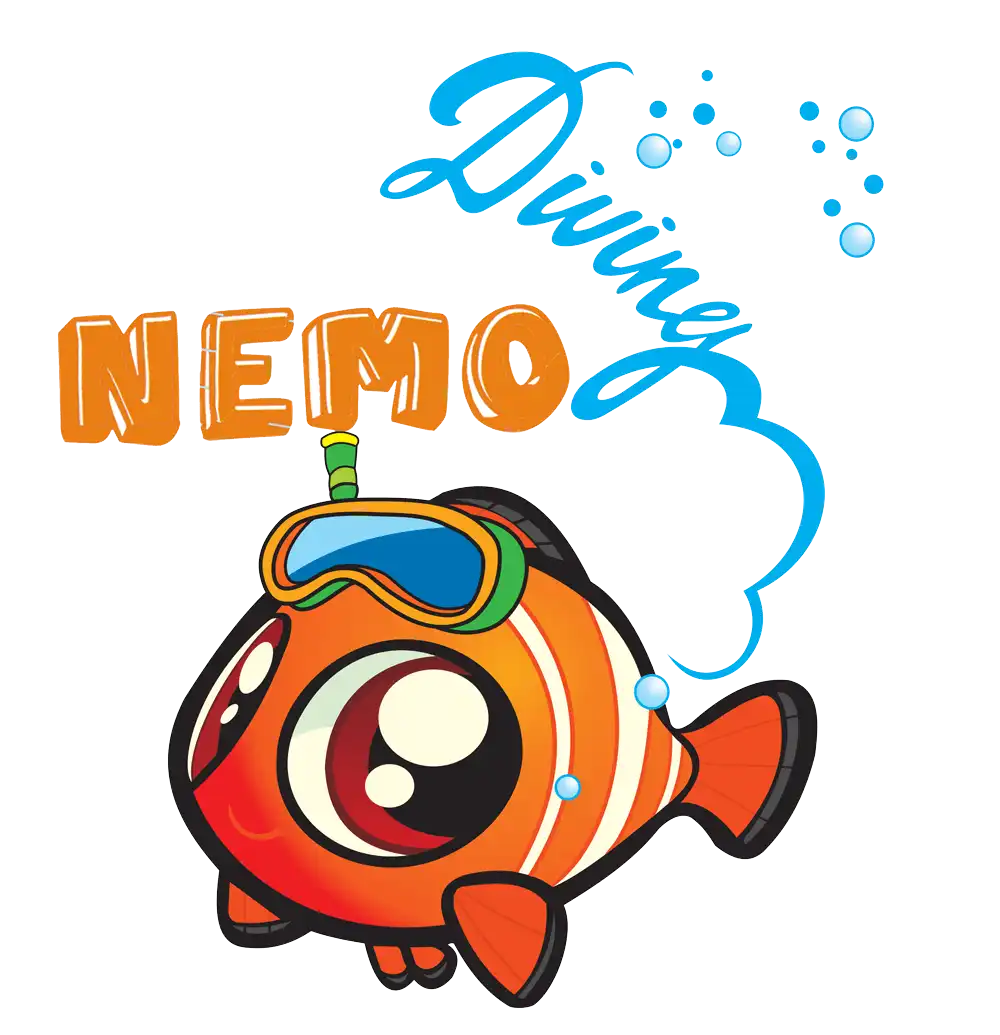
Cebu, Philippines is home to some of the most incredible world-class dive sites, from kaleidoscope-like coral reefs bursting with marine life to intriguing shipwrecks and underwater caves. If you haven’t been to this corner of the world, then you’re missing a lot. Join us on our upcoming Philippine trip to experience this fantastic tropical destination.
Nemo Diving Center together with Flying Fish Travel brings you a Philippine trip dubbed “All Shapes and Sizes”. This 3-night underwater adventure features beautiful Cebu diving spots and an exciting diving itinerary.
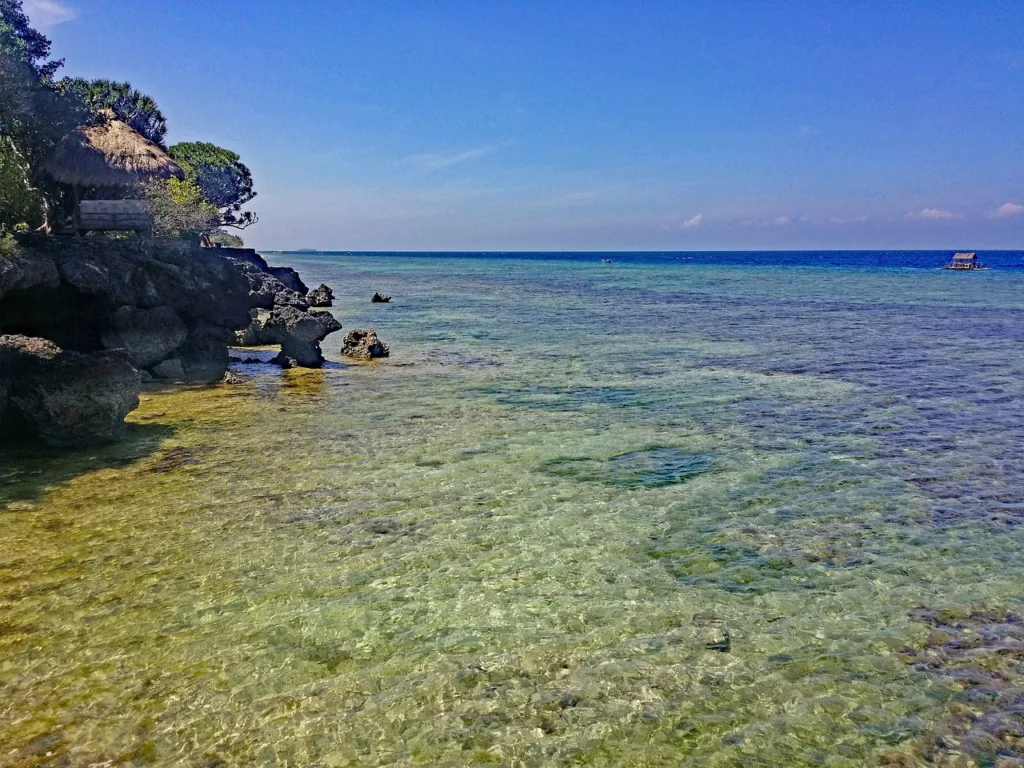
Moalboal is a charming municipality in the province of Cebu where you can find Pescador Island, a mecca for divers from different parts of the world. This scuba diving gem is renowned for its plethora of marine life, breathtaking coral reefs, and astounding sardine run making it an irresistible draw for enthusiastic divers.
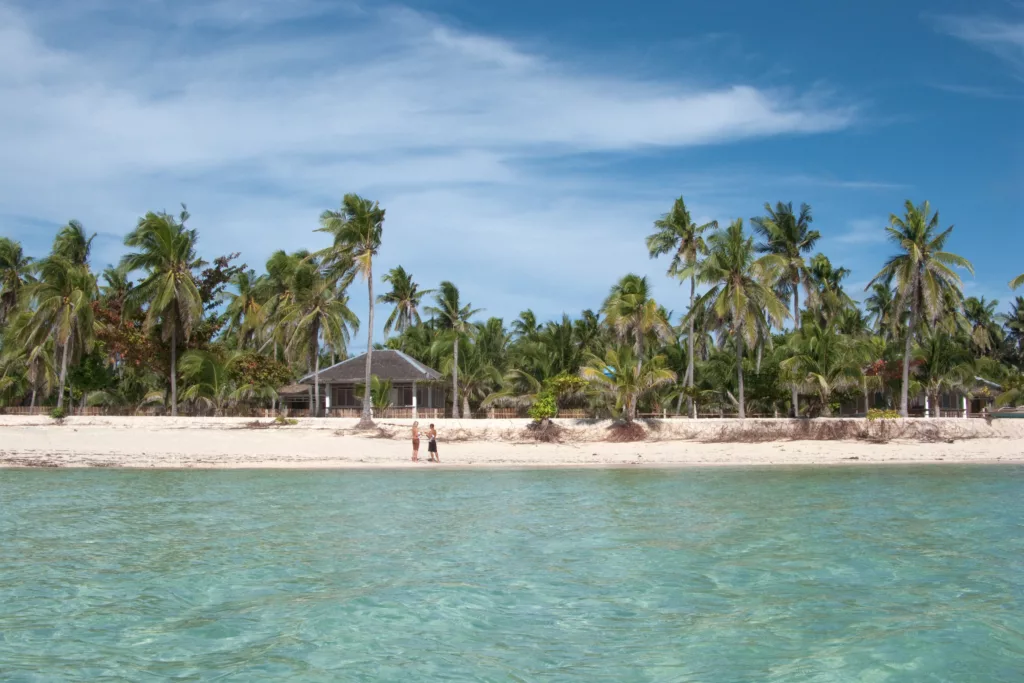
Malapascua is a small island off the coast of Cebu famous for its white sand and pristine waters. Divers from different parts of the world visit this island to see its diverse range of marine life, especially thresher sharks which are often spotted during early mornings at Monad Shoal.
Here are just a few of the incredible marine life that you may encounter in Cebu scuba diving spots.
Just imagine seeing a sea of dazzling silver during your Pescador Island diving. This awe-inspiring underwater phenomenon is none other than the sardine run where millions of sardines congregate in a synchronous movement. The sheer density of these tiny fish creates a mesmerizing effect, resembling a whirling ball of silver underwater which attracts different predators including tuna, barracuda, trevally, jacks, and thresher sharks. Join our trip for a chance to witness this breathtaking spectacle and tick it off your scuba diving bucket list.
There are three recognized species of thresher sharks namely the common thresher, the bigeye thresher, and the pelagic thresher. When you go Moalboal scuba diving, you are more likely to encounter the pelagic thresher (Alopias pelagicus). The pelagic thresher is the smallest among the three species with an average size of three feet. They are typically shy and non-aggressive towards humans. Like most sharks, thresher sharks are often solitary.
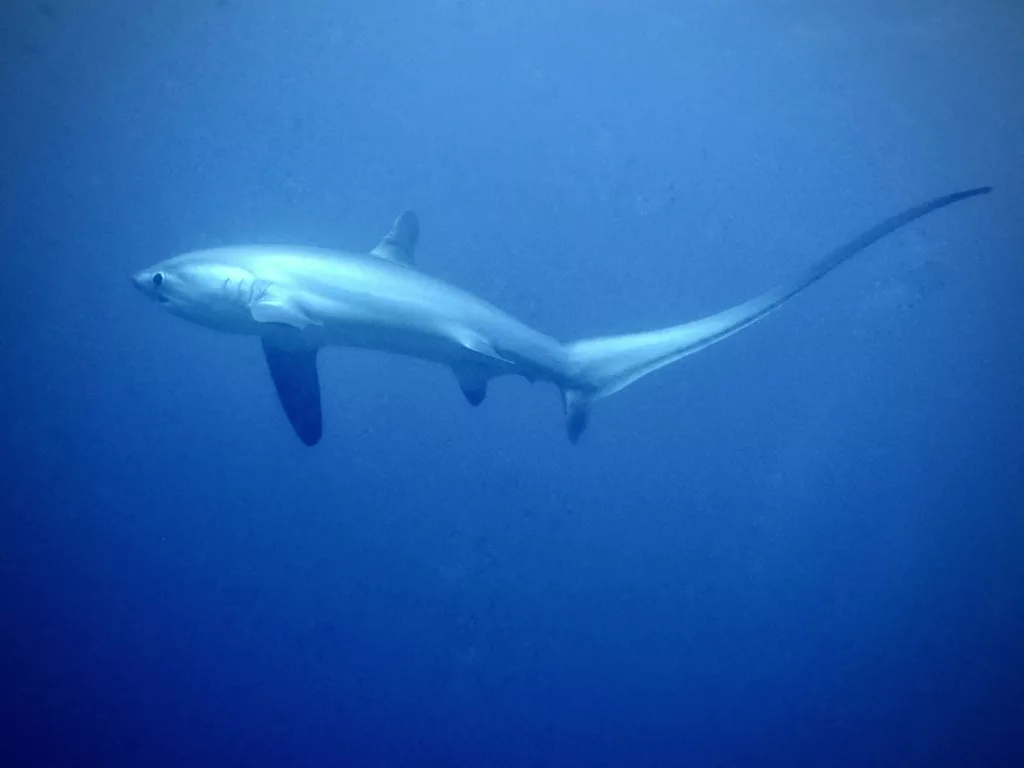
Thresher sharks have a unique feature that makes them stand out – their iconic long tail with elongated caudal fin which varies in size depending on the species. They are noted for slapping their tails in the water, a behavior used for stunning prey. This technique is also used to corral schooling fish into a tight ball, making them easier to catch. Thresher sharks like to feed on herrings and mackerels but are also fond of eating squid.
Stunning is an understatement when describing the mandarin fish. They are also called Mandarin Goby, Mandarin Dragonet, Green Mandarin fish, Psychedelic fish, and Striped Mandarin. They are small, typically reaching only 3 inches (8 centimeters) in length. Mandarin fish are diurnal creatures which means that they are usually active during the day.
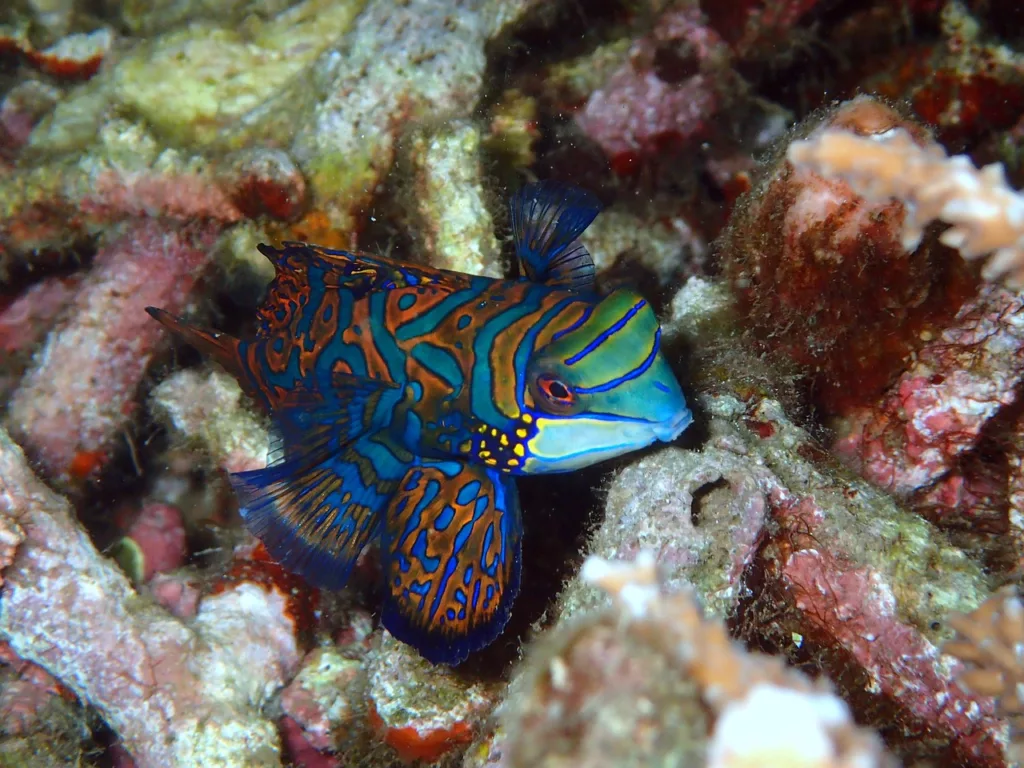
Bursting with colors, the mandarin fish have vivid patterns on the body that make them great subjects for underwater photography. Another fascinating thing about this species is its ritual reproduction mating “dance” wherein the females gather at the reef at sunset to seek a mate. The males begin their flashy courtship dance and the female chooses the male that she likes. She rests on his pelvic fin and the two float above the reef where they spawn. After a whirlwind courtship and the eggs and the sperm are released, the couple go on separate ways.
The blue-ringed octopus is a tiny species, about the size of a golf ball. When it’s in a relaxed state, the blue-ringed octopus appears beige or yellow. However, when threatened, it dramatically changes in color and showcases vibrant blue rings on its adorn its back, arms, and dorsal surface. Each ring has a dark center and blurred edge.
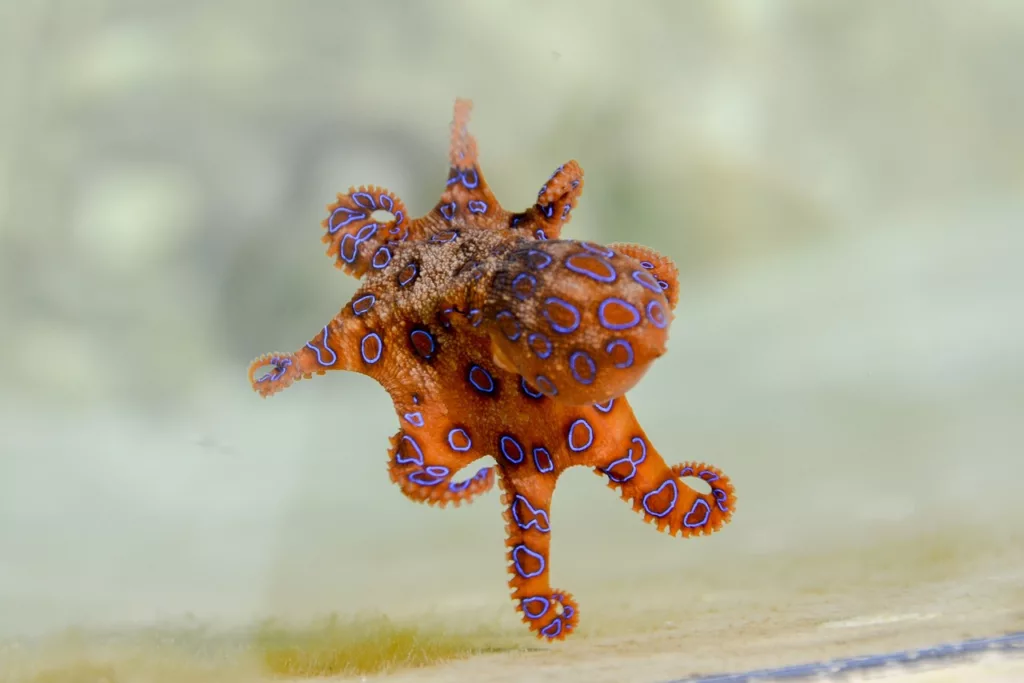
Like other octopus species, the blue-ringed octopus is a nocturnal creature. It usually hunts at night in search of its favorite prey like small crabs, shrimp, and other small crustaceans. During the day, it prefers hiding in crevices and holes.
Remember to observe this creature from a distance and do not attempt to touch it because it has a toxic venom.
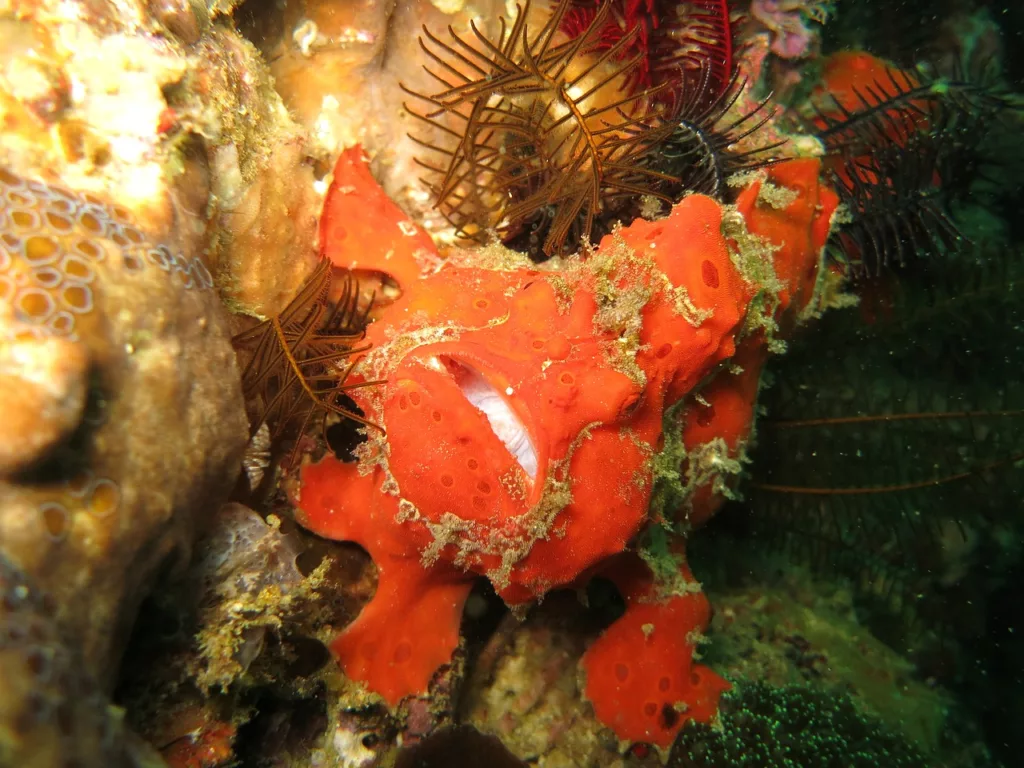
The frogfish, aptly named for its resemblance to the amphibian, is a unique underwater creature. Their bodies are covered in fleshy appendages and bumps, resembling sponges, coral, or even seaweed. Renowned for their incredible camouflage abilities, frogfish can mimic their surroundings with astonishing precision. This ability enables them to ambush unsuspecting prey such as fish, crustaceans, and sometimes other frogfish.
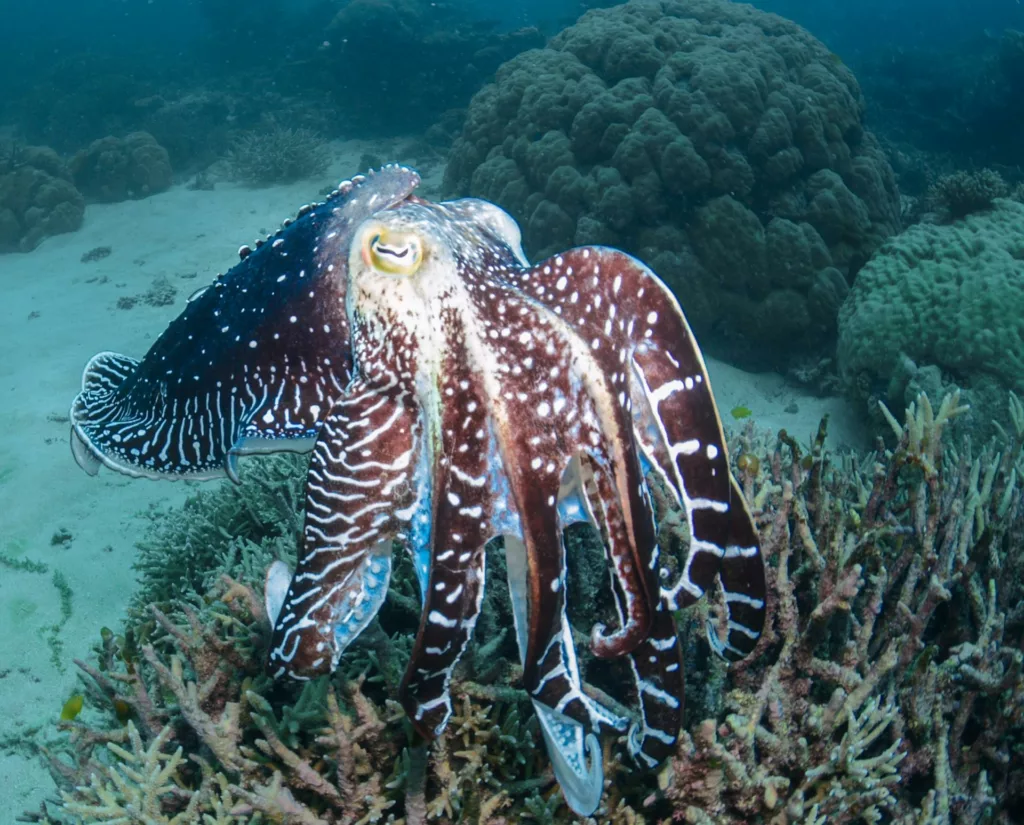
Did you know that the cuttlefish can display different colors, and patterns, and even imitate the texture of coral or seaweed when they are hunting or avoiding predators? This is why the cuttlefish is a pro when it comes to camouflage tactics. It can rapidly change its skin color and texture to blend seamlessly into its surroundings.
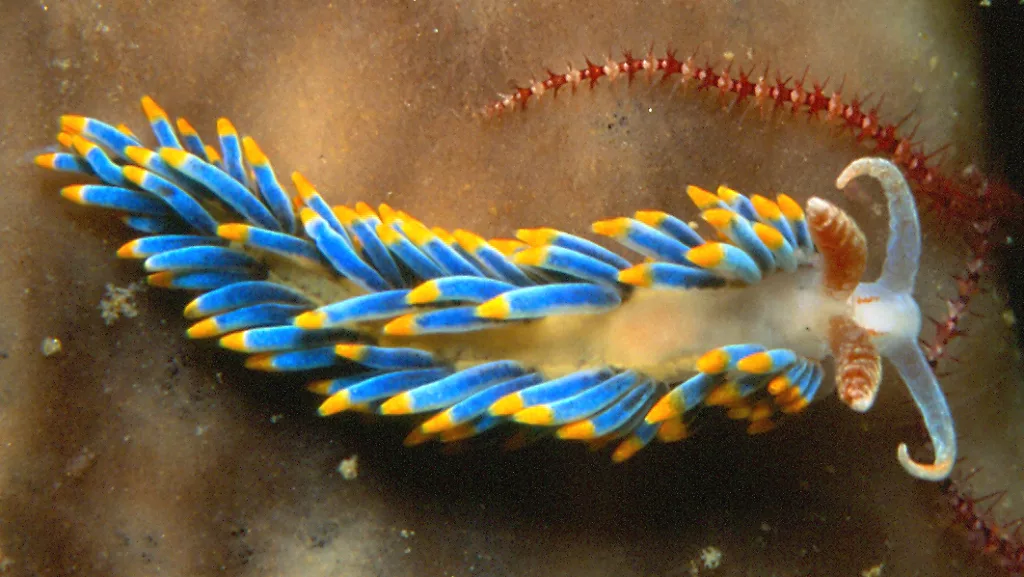
Nudibranchs come in intricate patterns and dazzling colors from vibrant blues and striking oranges to neon yellows and polka dots. No wonder divers love seeing them. Nudibranchs are also known for their slow and graceful gliding movements which makes them ideal photography subjects.
Please join our trip to Cebu, Philippines and get a chance to encounter these amazing marine creatures up close, especially the much-talked-about sardine run. We’ll take you to explore Cebu’s diving gems – Moalboal and Malapascua.
Nemo Diving Center promotes sustainable and eco-friendly diving practices. In line with this, our dive instructors promote responsible diving behaviors to protect the delicate marine ecosystems, avoid disturbing marine life, and ensure the safety of divers.
Experiences
Find the perfect escape
© 2024 NEMO DIVING CENTER
Scuba diving is an exciting and adventurous water sport that offers a chance to explore the beauty of the underwater world and its amazing marine life. The UAE, particularly Dubai, is one of the most popular destinations for scuba diving, attracting divers from all over the world. With its crystal clear waters and diverse marine life, scuba diving in Dubai offers a unique and unforgettable experience.
The cost of scuba diving in Dubai varies depending on the dive center you choose and the type of dive you opt for. On average, a single dive can cost anywhere from AED 250 to AED 550, with the average price for a single dive being around AED 350. This price usually includes all the necessary equipment, such as the dive tank, regulator, and wetsuit, as well as the services of a professional dive guide. At Nemo Diving Center, We offer a wide range of diving packages to suit every budget and experience level.
Diving in Dubai is an incredible experience, and the UAE is home to many dive sites teeming with amazing marine life including colorful soft and hard corals, sea turtles, stingrays, manta rays, moray eels, cuttlefish, octopus, nudibranchs, seahorses, and a plethora of fish species. It is also noted for its incredible dive wrecks that have become rich artificial reefs. These dive sites offer a unique and exciting diving experience, providing a chance to explore sunken ships and other structures that have become havens for marine life.
Come and explore the unique underwater world of Palm Jumeriah in Dubai and incredible dive sites in Fujairah such as Dibba Rock, Sharm Rock, Martini Rock, Snoopy Island, and more. At Nemo Diving Center, we offer dive trips to these amazing dive sites, allowing divers to discover the incredible marine life that has made the wreck its home. We also offer a wide range of other dive sites to choose from, including shallow coral reefs, deep wrecks, and drift dives, providing something for every level of diver.
In conclusion, scuba diving in Dubai offers an unforgettable experience for all levels of diver. With its clear waters, diverse marine life, and incredible dive sites, Dubai is a must-visit destination for any scuba diver. Whether you’re a beginner or an experienced diver, our team at Nemo Diving Center will ensure that you have an amazing time exploring the beauty of the underwater world.
Click one of our contacts below to chat on WhatsApp
Social Chat is free, download and try it now here!
